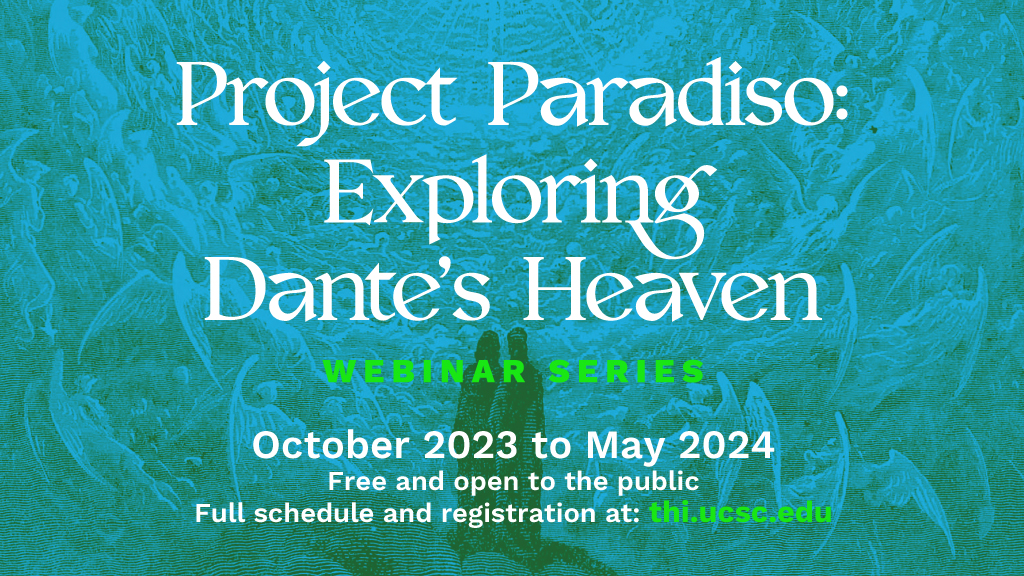Events

- This event has passed.
Project Paradiso: A Gateway to Dante’s Heaven – Episode Twelve – Flower of Humanity: The Vergin Mary in Paradiso
April 5 @ 9:00 am - 10:30 am | Virtual Event
Share
Dante’s Paradiso is the least studied and the least understood of the three parts of the Commedia. Yet it is arguably the most important for the dynamism and originality of the literary, theological, and philosophical inquiries that take place there. It is also a singularly important interpretive guide for a full understanding of the entire Commedia. It is a poem that asks to be tackled by a community of engaged readers: here it’s your opportunity! This year-long series of webinar workshops led by world-renowned scholars will take you on a deep reading of the Paradiso and an unforgettable journey to the heart of Dante’s universe. This virtual series will reward both first-time and expert readers of the Commedia with an opportunity to delve deep into one of the most complex and daring speculative poems ever written. We’ll be meeting online almost every other week from October to May. See the Project Paradiso page for full schedule.
Flower of Humanity: The Vergin Mary in Paradiso (Par. 23 and 31-33)
In lines of sublime beauty that fuse the fin’amor image of the rose with the ancient Marian type of the flos Iesse (Isa. 11:1), Dante tells us that Paradise itself, the candida rosa (Par. 31.1), is generated from the warmth of Mary’s womb: ‘Nel ventre tuo si raccese l’amore, / per lo cui caldo ne l’etterna pace così è germinato questo fiore’ (Par. 33.7-9). She is the termine fisso (3), the fixed point, upon which God’s plan of salvation turns. Without her fiat (Luke 1:28), Paradise would be a sterile bloom, deprived of the Love that breathes life into all things. Just so, it is her words that set Dante’s own journey in motion (Inf. 2.94-114) and it is she who mediates his final vision. Without her, one could argue, there would be no Commedia.
It is essential to recognize this centrality of the Virgin if one is to come to a proper understanding of her role in the Paradiso. Taking as its starting point the Prayer to the Virgin (Par. 33.1-39), this chapter will explore the multiple ways in which Mary is present in the third cantica (and more broadly of the poem as a whole), whether as a source of hope and grace, mediatrix, supreme example of humanity fulfilled, icon of the Church, or prophetic sign of the New Creation (Rev. 21.1). Ultimately, reading the poem in a Marian key, we may conclude that it is she, synthesis and apex of creation in all its beauty, who leads Dante (and possibly the reader too) into the heart of the Trinity where, become fully Christ, we too may glimpse something of the presence of God beneath all things.
 Brian K. Reynolds teaches in the Italian Department and the Graduate Institute of Comparative Literature of Fu Jen Catholic University, Taipei, specializing in Medieval Italian Literature and in Mariology. He received his primary degree from University College Dublin in Italian and history and went on to carry out his postgraduate studies at UCD and Trinity College Dublin. He also taught in both of these institutions and in the Università degli Studi, Bari prior to moving to Taiwan. Reynolds has written and spoken widely on Dante Alighieri and on Italian courtly and religious literature of the Middle Ages. At present he is mid-way through a project to produce a hypertext of the Divine Comedy.
Brian K. Reynolds teaches in the Italian Department and the Graduate Institute of Comparative Literature of Fu Jen Catholic University, Taipei, specializing in Medieval Italian Literature and in Mariology. He received his primary degree from University College Dublin in Italian and history and went on to carry out his postgraduate studies at UCD and Trinity College Dublin. He also taught in both of these institutions and in the Università degli Studi, Bari prior to moving to Taiwan. Reynolds has written and spoken widely on Dante Alighieri and on Italian courtly and religious literature of the Middle Ages. At present he is mid-way through a project to produce a hypertext of the Divine Comedy.
Reynolds is also a recognized expert on Patristic and Medieval Mariology having published a major study, Gateway to Heaven, on Marian doctrine and devotion as well as numerous articles and book chapters. He is currently completing the second volume of his Gateway to Heaven series, on Marian typological imagery. Reynolds is on the board of several journals including Claritas: Journal of Dialogue and Culture and Maria: A Journal of Marian Studies. He is the founder and convenor of the Dante in East Asia Network and is a member, specializing in Mariology, of the International Interdisciplinary Abba School, based in the Sophia University Institute.
Presented by the Humanities Institute and the Department of Literature Italian Studies. Sponsored by the University of California Humanities Research Institute, Siegfried and Elizabeth Mignon Puknat Literary Studies Endowment, and Porter College

